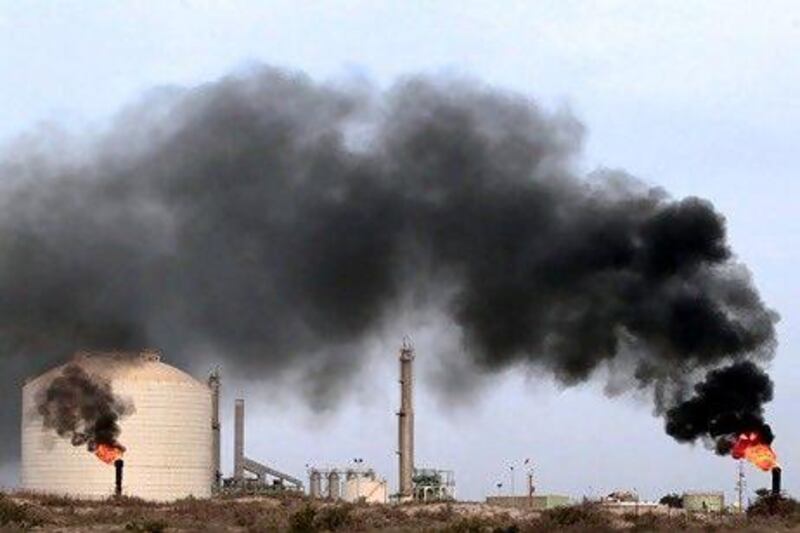Reflecting on his 1942 defeat by the British in Libya, the German general, Field Marshall Erwin Rommel, said: "Neither guns nor ammunition are of much use in mobile warfare unless there are vehicles with sufficient petrol to haul them around."
Oil is once again at the centre of today's war in Libya: at the tactical level, financially, for the conflict's global impact and for the country's future.
As it did for Rommel, oil may be emerging as Colonel Muammar Qaddafi's weak point. At the end of last week, fighters in the Nafusa mountains in western Libya reportedly cut an oil pipeline to Zawiya, Col Qaddafi's last operational refinery.
The transitional national council (TNC) has appealed to Tunisia to cut off fuel reaching Col Qaddafi by land.
And the next target of the Western mountain forces is the strategic town of Gharyan, which would block a key route from Algeria and the south to Tripoli.
Nato has intercepted tankers sailing to the capital, although the legality of this under UN resolution 1973 is dubious. It already takes drivers in Tripoli up to two weeks to fill up their petrol tanks. Only the secret police have ready access to fuel.
Refineries at Ras Lanuf and Brega are close to the eastern front line. Brega has been firmly held by Col Qaddafi since early April, but recent Nato strikes on the town may open the way for its capture.
Crude oil supplies to these refineries, such as those to TNC-held Tobruk, were cut off in early April by attacks from Col Qaddafi's forces on the oilfields and the booster station that supplies Tobruk. According to a British diplomat, damage is not severe, but as long as the fields are insecure, they cannot be repaired.
Col Qaddafi still holds strategic points at Kufra and Sabha in south Libya, from which his forces can launch raids. This demonstrates another truth from the 1942 desert war: as General Johann von Ravenstein observed: "The desert is a tactician's paradise - but a quartermaster's hell."
Manoeuvres and lightning strikes are easy in the open terrain, but keeping the regime's forces supplied with fuel will become increasingly difficult, eventually allowing the TNC to secure its oilfields. Interestingly, there is little or no evidence of the forces opposed to Col Qaddafi adopting similar guerrilla tactics and striking fuel convoys making their way from southern Libya. On the financial side, oil is of crucial importance to the TNC.
Without access to the Col Qaddafi's gold and hidden cash, they have so far been unable to unlock frozen Libyan funds overseas. Apart from one batch of crude sold from storage tanks in April, they have been reliant on donations from countries such as Qatar to fund their war effort.
If the fields were secured, they could ship 200,000 barrels per day (bpd) from Tobruk and possibly another 155,000 bpd from Brega, according to Goldman Sachs.
At a global level, the loss of 1.6 million bpd of high-quality Libyan crude drove prices above US$120 per barrel. This set the stage for the confrontation at Opec's recent meeting in Vienna, in which Libya was nonsensically able to argue alongside Venezuela and Iran for no increase in production.
The breakdown of that meeting led the consumers' group, the International Energy Agency (IEA), to order a release from emergency stocks, a step taken only twice before. The US' use of its strategic petroleum reserve demonstrates the political importance to the Obama administration, facing pressure over funding for the military operations in Libya, of reducing petrol prices.
The sooner the war ends, the sooner oil prices will come down, easing strains on the global economy. Yet it is politically impossible for Western leaders to point to this as a motive for stepping up the pressure on Col Qaddafi. If he falls in the near future, the IEA stock release will seem a wise move, and Barack Obama, the US president, and those European allies who argued for intervention, will gain credit.
Once the war is over, there will be three major tasks. Firstly, repairing damage and restoring production. The IEA believes capacity could return almost to pre-crisis levels by 2013 and be fully restored by 2015. Secondly, setting the rules for the future Libyan petroleum industry. And thirdly, post-war economic reconstruction, finally using the Libyan people's resources for their benefit.
All these tasks will be vastly easier if the oil infrastructure survives largely intact. Yet air power alone cannot protect oilfields in the desert, and Nato will not be seen to undermine the country's post-war future by bombing regime-held oil facilities. If the TNC forces do sabotage pipelines and refineries, they have to do enough to shut them down, but allow them to be quickly repaired.
With the gradual tightening of the noose, this petro-state's dictator faces the irony of being defeated by fuel shortages.
Libya's is not a war for oil, but oil will be a major part of deciding its destiny.
Robin Mills is an energy economist based in Dubai, and the author of The Myth of the Oil Crisis and Capturing Carbon





